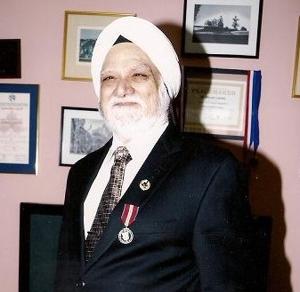On the eve of the Hindu festival of Holi this year, 10 men gathered outside a jewelry shop in the north Indian city of Kanpur carrying effigies. The cardboard statues, created to burn as part of a tradition of the festival, were five feet tall with pink heads and twirled mustaches on their faces. On the torsos, the men stapled an image of Jeff Bezos, founder and CEO of Amazon.
The men were part of a live demonstration organized by Praveen Khandelwal, a Delhi-based businessman who leads a network of roughly 80 million small business owners called the Confederation of All India Traders, or CAIT. While the men in Kanpur prepared their effigies of Bezos, hundreds of other traders around the country displayed their own in a Zoom call (the demonstration was meant to be held in-person, but India was on the verge of a deadly second wave of Covid-19 cases, and cities across the country were already in lockdown). Some of the businessmen video-called from inside their own stores, others were perched on their balconies and terraces, and some just stood on the street. Many had their own cardboard versions of the world’s richest man: a shopkeeper and his two young children held a headshot of Bezos on the Zoom call, along with a cutout of the multi-headed demon king Ravana with “AMAZON” emblazoned across his chest.
On Khandelwal’s cue, they set their effigies of Bezos ablaze. During Holi, the effigy burning represents the destruction of the demoness Holika, an annual triumph of good over evil. For the shopkeepers and traders, Bezos was the demon to burn this year.
The stunt was the latest in Khandelwal’s playbook. The 60-year-old is a businessman with deep ties to Narendra Modi’s Bharatiya Janata Party, or the BJP, and has been in the public eye as the leader of CAIT for over 30 years. Khandelwal and traders like him are the bread and butter of Modi’s support in India; they represent the Indian Main Street, the homegrown economy Modi loves to boast about in his speeches. But pandemic-induced lockdowns have ravaged brick-and-mortar businesses in India, giving foreign e-commerce platforms like Amazon a shot at cracking India’s one billion-plus consumers.
While more and more Indians turn to Amazon and e-commerce platforms like it— its 90 million online shoppers are estimated to nearly quadruple by 2025—Khandelwal’s supporters are pushing for their prime minister to take a firmer stance against the Bezoses of the world setting up shop on their turf. Khandelwal is even launching a trader-friendly e-commerce platform, aptly named Bharat E Market, or “India’s E Market,” to try and eke out a share of an online economy closing around them.
As the mannequins began to burn and plumes of smoke appeared on the screen, the sellers on the call began chanting “Amazon Go Back!” in unison, a reference to anti-colonial calls against the British.



Write a comment ...